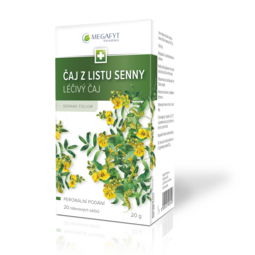Traditional herbal medicinal product
Sennae folium
For peroral use
Use
Always take this medicine exactly as described in this leaflet or as your doctor or pharmacist has told you. Check with your doctor or pharmacist if you are not sure.
Herbal medicine intended for short-term treatment of functional constipation.
Ingredients
- Sennae folium (senna leaf) 1.0 g in 1 infusion bag
Preparation
Pour ¼ l of boiling water over 1 infusion bag, leave it to infuse for 15 minutes. Tea should be drunk warm once a day, preferably at bedtime.
The infusion is always prepared fresh, immediately before use. The effect occurs in 8 to 12 hours.
Serving the tea 2-3 times a week is usually sufficient. The preparation is only intended for short-term use, no longer than one to two weeks.
If the health condition does not improve during the administration of the product, consult a doctor.
Do not use the product for more than two weeks without consulting a doctor.
Packaging
20 x 1.0 g / with wrapper
Storage
Keep the product out of the reach and sight of children.
Store below 25 °C in the original package in order to protect from moisture.
Caution
If it is necessary for you to use a laxative every day, it is necessary to investigate the cause of the constipation. Long-term use should be avoided, as it can lead to bowel dysfunction and dependence on laxatives.
If you suffer from kidney disease, administration of the product may cause an imbalance in the level of electrolytes, so consult your doctor about the use of tea.
If you are using cardiac glycosides (digoxin), antiarrhythmics (medicines against heart rhythm disorders; e.g. quinidine, amiodarone, verapamil, etc.), diuretics (medicines that increase the production and excretion of urine), adrenocorticoids or preparations containing licorice, consult your doctor before you start using senna leaf.
If you suffer from chronic constipation or other undiagnosed digestive problems (e.g. abdominal pain, nausea, vomiting), consult a doctor, as these symptoms may be a sign of a serious medical problem (intestinal obstruction).
It is advisable to use senna leaf only if it is not possible to improve the difficulties by changing the diet or use bulk laxatives.
Patients suffering from incontinence (inability to hold stool) need to change sanitary napkins more often to avoid excessive skin contact with stool.
If any unusual reactions occur, stop using the product and consult a doctor.
Do not use after the expiration date stated on the package. Return the unused drug back to the pharmacy.
Contraindication
Do not use the tea in case of known hypersensitivity to the medicinal substance, obstruction, narrowing and/or laxity of the intestines, appendicitis, inflammatory bowel diseases (e.g. Crohn's disease, ulcerative colitis - inflammation of the large intestine accompanied by the formation of ulcers), abdominal pain of unknown origin, fluid loss and electrolyte depletion.
Tea must not be consumed by children under 12 years of age. Use in pregnant women and breastfeeding mothers is not recommended.
Interaction
Long-term use of the product reduces the level of potassium in the blood, which can increase the effect of cardiac glycosides and affect the effect of drugs used for heart rhythm disorders.
The concomitant use with adrenocorticoids, diuretics (medicines that increase the production and excretion of urine) and licorice can increase the electrolyte imbalance.
Side effects
The product can cause skin reactions (itching, hives, redness of the skin).
The product may cause crampy abdominal pain and watery stools, especially in patients with irritable bowel syndrome. However, these symptoms also occur in overdose. In these cases, it is necessary to reduce the dose.
Chronic use can cause water and electrolyte imbalances, which can lead to protein and blood in the urine.
With long-term use (or overdose), diarrhea occurs, which leads to excessive loss of water and minerals (especially potassium), which can cause, for example, heart problems and muscle weakness. Long-term use of high doses can cause toxic inflammation of the liver.
During the use of the product, the urine color change (yellow or reddish-brown coloration) may occur, but this is not clinically significant and will disappear spontaneously.
Long-term use can cause pigmentation (coloring) of the intestinal mucosa (pseudomelanosis coli), which usually subsides after discontinuation of the product.

 Herbal medicinal products
Herbal medicinal products  Herbal Pharmacy
Herbal Pharmacy Children´s teas
Children´s teas Fruit and other teas
Fruit and other teas Wellbeing
Wellbeing Limited edition
Limited edition

 Facebook
Facebook Instagram
Instagram